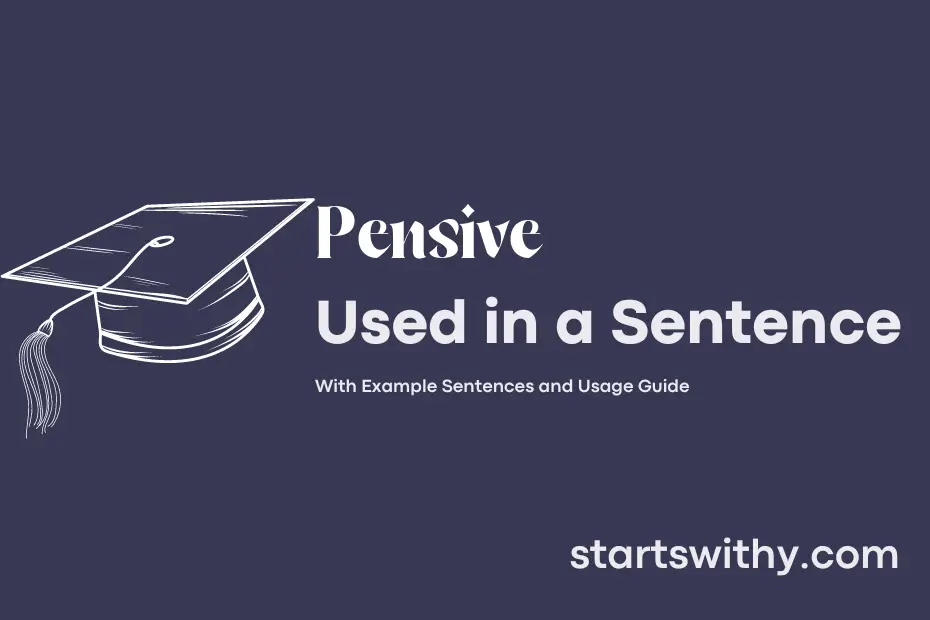Have you ever found yourself lost in thought, deep in contemplation? This state of mind, often accompanied by a furrowed brow and a faraway gaze, is known as being pensive.
When someone is pensive, they are engaged in a profound process of introspection and reflection, often pondering deeply about a particular topic or issue. This state of contemplation can sometimes be mistaken for being distant or detached, as the individual is immersed in their own thoughts and feelings.
7 Examples Of Pensive Used In a Sentence For Kids
- Pensive means thinking deeply.
- Sometimes when we are quiet, we are feeling pensive.
- It is okay to be pensive and reflect on our thoughts.
- Being pensive can help us come up with good ideas.
- Let’s all try to be a little pensive during our quiet time.
- You can draw a picture of yourself looking pensive.
- After we read a story, we can be pensive and think about what we learned.
14 Sentences with Pensive Examples
- Pensive students gathered in the library, deep in thought about their upcoming exams.
- As the professor lectured, a pensive look crossed the faces of the college students, trying to grasp the complex concepts.
- The pensive expressions of the students reflected their contemplation over choosing a major for their degree.
- Amidst the bustling campus, a group of pensive students sat on the steps, discussing their career aspirations.
- In the late hours of the night, a pensive student stared out of the window, pondering over a research paper.
- The pensive atmosphere in the classroom indicated that the students were reflecting on the ethical dilemmas presented in the case study.
- During a group project meeting, a pensive student scribbled notes in their notebook, contemplating different ideas.
- Surrounding the notice board, a group of pensive students read through internship opportunities, deep in thought about their summer plans.
- The pensive expressions on the faces of the college students suggested a shared concern about the impact of climate change.
- A pensive student sat in the college canteen, sipping coffee and reflecting on their personal goals and ambitions.
- While waiting for their turn in the laboratory, a pensive student reviewed their notes, mentally preparing for the experiment.
- In the career counseling session, a pensive student listened intently, considering various options for further studies.
- Sitting in the park, a group of pensive students discussed the social issues affecting the country, exchanging thoughtful insights.
- The pensive silence in the lecture hall indicated that the college students were pondering the implications of globalization on the economy.
How To Use Pensive in Sentences?
Pensive is an adjective used to describe someone who appears deep in thought or lost in contemplation.
In a sentence, you can use pensive to describe a person’s expression when they look serious and reflective. For example, “She sat by the window with a pensive expression, gazing out at the sunset.”
You can also use pensive to describe the atmosphere or mood of a place or situation. For instance, “The room was filled with a pensive silence as everyone reflected on the news.”
When using pensive in a sentence, it’s important to ensure that the context fits the definition of someone being thoughtful or introspective. It is not typically used to describe someone who is sad or unhappy, but rather someone who is deep in thought.
Remember that pensive is an adjective, so it is usually placed before a noun in a sentence to describe the person or situation. It can also be modified with adverbs like “deeply” or “quietly” to give more detail to the level of thoughtfulness being portrayed.
Overall, using pensive in a sentence can help convey a sense of reflection and contemplation, adding depth to your descriptions and creating a more vivid image for your readers or listeners.
Conclusion
In conclusion, pensive sentences evoke a reflective and thoughtful tone, inviting readers to contemplate various ideas or emotions. Through sentences that are pensive in nature, writers can convey a sense of introspection, nostalgia, or deep contemplation, creating a connection with the reader by tapping into shared human experiences. These sentences allow for a deeper exploration of themes and emotions, enriching the reader’s understanding and engagement with the text.
By incorporating pensive sentences into their writing, authors can add depth and sincerity to their work, drawing readers into a world of introspection and contemplation. This deliberate use of language can create a powerful impact, sparking the imagination and emotions of those who encounter these thought-provoking sentences, and leaving a lasting impression on their hearts and minds.



